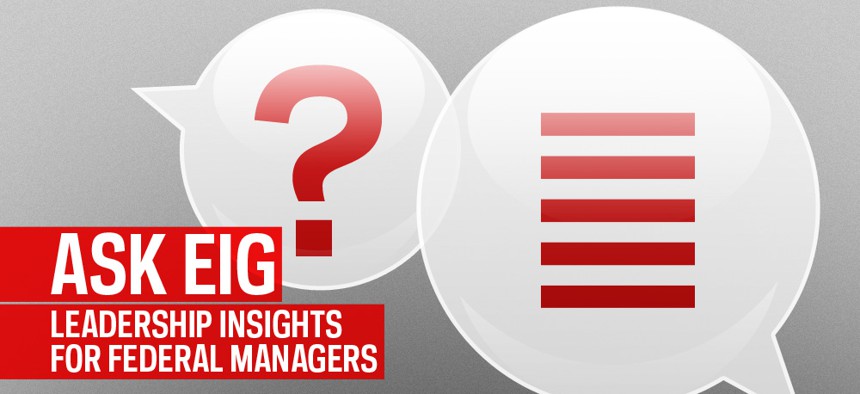
Ask EIG: How To Get Through An Interview for the SES
What should I do if I get an interview to join the SES?
Ask EIG is your chance to seek answers to public sector management challenges and conundrums. Submit your questions here.
The purpose of “Ask EIG” is to respond to questions and host conversations about how to improve leadership thinking and, ultimately, capabilities. Such improvement is all for not if you don’t actually get the job so I especially appreciate today’s question.
It is not uncommon for senior leaders to use several approaches to winnow applicants down to a small pool. Phone interviews are one of many hurdles, all of which you have to successfully navigate if you want to end up in the final pool from which a selection will be made.
With phone interviews, and in particular with a committee on the line, what kinds of questions will be asked? What will the committee be looking for? How can you shine through a telephone line and demonstrate that you have the right stuff?
(HAVE A QUESTION? Submit your most pressing management questions below or click here)
First and foremost please know that I have never been on such a hiring committee for SES candidates. But I have been on hiring committees, and even have run a few, at my university including ones for selecting a provost, a dean, and a variety of senior leaders. I believe much of what I have learned translates to government agencies.
How do hiring committees work? Typical committees ask the same questions of all candidates. With only 30 minutes, expect about five questions, give or take. At least some questions are likely to focus on the Office of Personnel Management’s Executive Core Qualifications (ECQs). (Of course, carefully reading the job posting will give you important clues about what might be asked.)
The purpose of the questions often is threefold. First, the committee wants to assess your experience with leadership challenges. Second, they want to assess your (hopefully) great communication skills. Third, the committee will likely want to get a sense of your ability to aspire to deliver great value, inspire your future team to achieve success, and perspire, which is your willingness to set a good example by working hard.
While these general may be of some help, they don’t offer specific recommendations. Here are three specific recommendations that you can practice for your interview.
- Your response to a question should be short, calm, and clear. After hearing the question do not start talking immediately. Instead, gain some time for thinking by thanking them for the question. Pause and jot down one, two, but no more than three main points that you wish to express in response to the question. Once you have these points in hand, briefly state them. For instance, “Thank you for your question on how I have led change in my existing organization. In response I would like to talk you about a specific challenge my organization faced, how my team and I responded to it, and the outcomes achieved.” Move on to describe each point, restating the points when finished. Even though you are the candidate, you should be thoughtful about managing time. While you cannot manage the interview itself, you can manage your responses to questions by keeping them to less than 3 minutes—with such a short interview talking longer likely will signal that you are rambling.
- Your responses are most powerful when they come in the form of a short narrative, story, or vignette. People typically find it easier to remember an impactful story instead of hearing facts taken out of context. A brief story with characters (with a hero other than you), a plot with some type of tension or conflict, and a climax with a resolution that you contributed to can be particularly memorable. Describing how you enabled the hero in your story is a great way to illuminate the very desirable trait of leadership of empowering others.
- Be candid about mistakes (big and small) and how you took ownership and learned from them. In fact, I believe the best vignettes are those that highlight how a candidate first thought one way and then learned to think another, better way. Such “mistakes” and willingness to learn highlight how leaders take responsibility, learn, and lead, which is important for every ECQ.
Practice may not “make perfect” but it does “make better”. Have a friend or significant other interview you with his or her own questions. Record the interview (a smart phone, computer, or other digital device can do this easily for you). Don’t stop or ask to start over if you stumble. Finish your response as if the interview is real. When done, do something else for at least 10 minutes before listening to the recording so that you can refresh your mind. Listen to your responses without making any comment. Once done, find three things you did well in your response. Once you appreciate what you did well then, and only then, identify three things you could have done better. Repeat the process.
While I can’t promise that you will get the job, practicing the three steps outlined above and then reflecting will help you advance your thinking and interviewing capability. I wish the best for you in the interview!
Duce a mente (May you lead by thinking),
Jackson Nickerson
NEXT STORY: The FBI's Approach to the Boston Bombings







